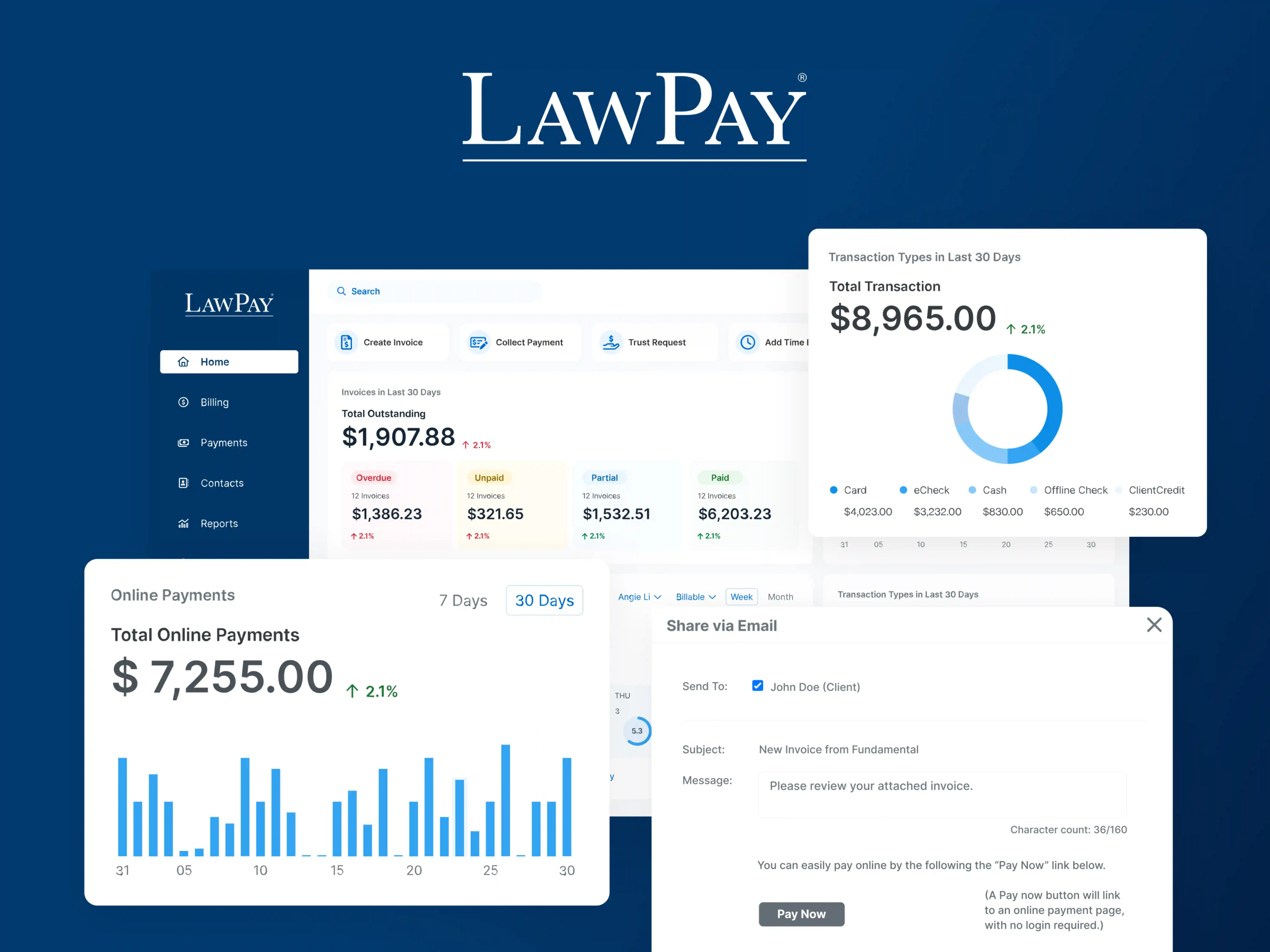Apps designed for lawyers address key functions within your practice, from managing case files to getting paid. Even if your firm doesn't have a remote-work policy, bringing firm-critical functionality to your smartphone vastly increases your productivity—by allowing you to engage in real-time with your files and systems during train commutes, cab rides, and courthouse breaks.
Read on to learn how apps can help you work smarter, and to discover 10 apps that lawyers everywhere are raving about.
Schedule a demo to see what LawPay can offer your firm.
Book Now
What Are Lawyer Apps?
Many law firm apps are mobile versions of desktop programs. LawPay and MyCase are two examples. Both are desktop, cloud-based law firm software applications that streamline and automate some of the more cumbersome tasks you and all lawyers face daily.
Because these platforms store files and data securely in the cloud, their respective mobile apps can seamlessly and securely tap into that information. This means you can work directly on your own system from your mobile, without duplicating files or cutting and pasting.
There are also many apps that are relevant and useful for lawyers but are not specifically "lawyer apps." These more general applications simplify actions lawyers perform regularly—such as note taking, PDF file management, transcription, and topic-specific news aggregation.
What Are the Benefits of Using Apps Designed for Lawyers?
Efficiency is the primary benefit of using apps for lawyers. Smartphone apps allow you to work from anywhere as long as you have Wi-Fi. That gives you more productive time throughout your day. When you're taking a cab to the courthouse or waiting for a client who's running late, you can be managing your calendar, reviewing digitized documents, or documenting your thoughts about a difficult case.
The added efficiency can improve your bottom line, too. Seamless mobile access to case files, timecards, and billing information means faster answers to client questions, more billable time in the day, and quicker payments.
On a more granular level, many apps also streamline tasks when compared to their desktop versions. Since apps are designed for smaller screens, they tend to simplify critical actions. They do this through layout primarily—giving you, say, access to the most important tasks with fewer clicks.
The 10 Best Apps for Lawyers
Our list of the 10 best apps for lawyers below includes both law apps and more general apps that can create daily efficiencies for any legal professional. Use this list alongside our quiz to assess legal tech providers to develop an app stack that works for you.
1. LawPay for Online Payments
Possibly the most impactful lawyer app you can have is one that streamlines mobile payments.
The LawPay mobile app brings LawPay's state bar-approved payment functionality to your smartphone. Accept payments using a Bluetooth swiper or your phone's camera to collect card numbers quickly, capture digital signatures, and direct payments into trust or operating accounts as needed. You can also view and manage past transactions while you're on the go or meeting with a client offsite.
You'll need a LawPay account to use the app, but you can download LawPay for iOS or Android free.
2. MyCase for Practice Management
The MyCase law apps for iOS and Android provide access to your case and law firm files from anywhere. Use the app to check and manage your calendar, add time entries, complete tasks, send client messages, and stay current on what's happening with your practice while you're away from the office.
The work you do in the app updates your firm's files, calendars, and task lists directly and automatically in the cloud. Whether you're checking off tasks from your office computer or your mobile phone, all of your information remains synced and current.
The MyCase mobile app, for either operating system, is included at no extra charge with Pro or Advanced MyCase plans.
3. LawStack for Legal Research
LawStack is another of the more popular legal apps. It downloads U.S. Code, Code of Federal Regulations, and state regulations to your mobile device. A user-friendly search function then allows you to find the statutes you need, quickly and easily. As a result, you can research on the go, without having to carry bulky texts or even a computer. Also, once you download the rules, you can access them without an internet connection.
LawStack is free to download for iOS and Android. You can access many federal statutes without a subscription, but you'll need a paid plan to access the laws of your state.
4. Evernote for Notes and Organization
Evernote organizes thoughts, notes, files, voice memos, and files into folders. You can also create tasks inside your notes, clip and store web pages, and locate anything in your account with a keyword search.
The free plan gives you access to your notes from two devices, as well as 60 MB in monthly uploads. There are also two paid plan options with more robust functionality. Those added paid features include integration with Google Calendar, PDF markups, and task due dates, reminders, and notifications.
Evernote also has a team plan with collaboration and sharing capabilities.
5. Penultimate for Digital Handwriting
Penultimate is a handwriting app, ideal for those who prefer to jot down their thoughts via written notes or sketches. Simply open the app on your iPad and start writing with your Apple Pencil or Adonit stylus. As you work, the page seamlessly adjusts to accommodate your writing size and speed.
Penultimate also connects to and syncs with Evernote for easy organization. Your handwritten notes are also searchable.
Penultimate is free to use, but it's available for the iPad only. Android tablet users may try apps Squid or Saber, which have similar functionality.
6. Adobe Scan for PDF Scanning and Searching
The Adobe Scan app scans documents, receipts, business cards, whiteboards, and forms into searchable, editable PDFs. Scans are saved to your Adobe cloud storage account.
Combine Adobe Scan with the Adobe Acrobat Reader app and you can mark up your scans with notes and highlights. With a paid Acrobat Pro account, your scans become fully editable and accessible from any device or location.
When you use Adobe Scan for business cards, the contact information automatically imports to your device's contacts. You can even scan multiple cards and select which you'd like imported.
Adobe Scan is free for Android and iOS. You can unlock greater functionality by using Adobe Scan with paid Adobe tools.
7. Otter for Recording and Transcribing Notes
Otter records and transcribes the human voice. Turn it on to record the great idea you had while driving or use it to document entire meetings with clients or your team. You can then review, edit, share, and organize your recordings. You can also import audio files from other sources for transcription.
Otter also connects with Google Calendar and Contacts, Dropbox, Microsoft Calendar and Contacts, and Zoom, the next app on this list. You can use Otter's basic features for free, or upgrade to one of three paid plans for more functionality. Otter is available for Android or iOS.
8. Zoom for Video Meetings
Video conferencing app Zoom allows you to be in two places at once. You can hop onto a video meeting with a client in Chicago from your desk in Los Angeles. The app also supports file sharing, screen sharing, text chat, and collaborative digital whiteboarding.
With a free Zoom account, you can host meetings up to 40 minutes long with as many as 100 participants. Paid plans have extended limits plus added features, such as cloud storage and phone calling from your business number.
9. Feedly for Content Monitoring
Feedly combats information overload by aggregating and organizing news from websites, blogs, and newsletters. You specify the content streams for the app to follow and prioritize the topic areas that interest you most. You can also share relevant insights or stories with your team.
Feedly is available for Android and iOS. You can follow up to 100 feeds and maintain three organizational folders for free. Paid plans with higher limits and more features start at $6 monthly.
10. Hookle for Social Media Management
Hookle streamlines social media post creation, scheduling, and tracking. Whether you're managing the firm's social media accounts yourself or delegating it to your staff, Hookle will add efficiency to the process.
The app uses AI to generate suggested captions and hashtags. The only input required is a word or phrase referencing any subject. Once you have a post ready, you can schedule it to multiple social media accounts, provided you have already connected them to Hookle.
You can also view your social media calendar to track what you've scheduled and already posted. And finally, you can check the stats screen for a quick recap of how your posts are performing.
Hookle is available for Android and iOS. There are two plans available—a free option with limited functionality and a paid option that's either $60 per year or $9.99 per month. Hookle supports Facebook, Instagram, Twitter, Pinterest, LinkedIn, and Google Business.
Final Notes
The right legal apps for you are the ones that address tasks you repeat regularly. Putting law firm software functionality on your smartphone or other portable device increases your daily productivity and streamlines those essential tasks.
Schedule a demo to see what LawPay can offer your firm.
Book Now
You'll likely benefit from an app stack that includes law firm apps and more general apps. Law firm apps like LawPay and MyCase bring compliant payments and case files with you wherever you go. General apps like Evernote, Penultimate, and Otter keep your thoughts, notes, and ideas organized and accessible.
However you choose to equip your smartphone, understanding the app landscape for lawyers is essential to remaining competitive in this digital era. To learn more about the payments functionality in the LawPay, schedule a demo today. You can also explore various MyCase features and benefits with a free trial.
About the author

Catherine BrockContent Writer
Catherine Brock is a Content Writer for leading legal software companies, including MyCase, Docketwise, CPACharge, CASEpeer, and LawPay—the #1 legal payment processor. She covers emerging legal technology, financial wellness for law firms, the latest industry trends, and more.
